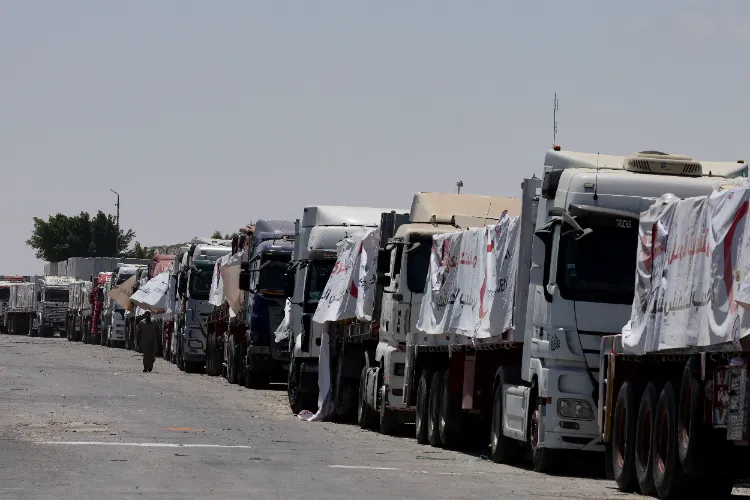
Jerusalem
Gaza's fragile ceasefire faced its first major test on Sunday as Israeli forces launched a wave of deadly strikes, saying Hamas militants had killed two soldiers, and an Israeli security official said the transfer of aid into the territory was halted.
The military later said it resumed enforcing the ceasefire, and the official confirmed that aid deliveries would resume on Monday. The official spoke on condition of anonymity because he is not authorised to discuss the issue with the media.
A little over a week has passed since the start of the US-proposed ceasefire aimed at ending two years of war. US President Donald Trump said the ceasefire remained in place and “we want to make sure it's going to be very peaceful.”
He told reporters aboard Air Force One on Sunday that Hamas has been “quite rambunctious” and “they've been doing some shooting.” He suggested that the violence might be the fault of “rebels” within the organisation rather than its leadership.
“It's going to be handled toughly but properly,” he said. Trump did not say whether he thought the Israeli strikes were justified, saying “it's under review.”
Vice President JD Vance said on Sunday that he may visit Israel in the coming days.
“We're trying to figure it out,” he told reporters, saying the administration wants to “go and check on how things are going.” Regarding the ceasefire, he said that “there's going to be fits and starts.”
Health officials said at least 36 Palestinians were killed across Gaza, including children. Israel's military said it struck dozens of Hamas targets after its troops came under fire.
A senior Egyptian official involved in the ceasefire negotiations, on condition of anonymity, said “round-the-clock” contacts were underway to de-escalate the situation.
Israeli Prime Minister Benjamin Netanyahu directed the military to take “strong action” against any ceasefire violations but did not threaten to return to war.
Israel's military said militants had fired at troops in areas of Rafah city that are Israeli-controlled according to agreed-upon ceasefire lines.
Hamas, which continued to accuse Israel of multiple ceasefire violations, said communication with its remaining units in Rafah had been cut off for months and “we are not responsible for any incidents occurring in those areas.”
Strikes in Gaza
Palestinians feared war would return to the famine-stricken territory where Israel cut off aid for over two months earlier this year after ending the previous ceasefire.
“It will be a nightmare,” said Mahmoud Hashim, a father of five from Gaza City, who appealed to US President Donald Trump and other mediators to act.
Al-Awda hospital said it received 24 bodies from several Israeli strikes in the Nuseirat and Bureij camps in central Gaza.
An airstrike on a makeshift coffeehouse in Zawaida town in central Gaza killed at least six Palestinians, according to Gaza's Health Ministry, part of the Hamas-run government. A strike in Beit Lahiya in the north killed two men, according to Shifa hospital.
Another strike hit a tent in the Muwasi area of Khan Younis in the south, killing at least four people, including a woman and two children, according to Nasser Hospital.
ALSO READ: Kashmir scripture Nilmat Purana mentions use of firecrackers on Diwali
"Where is peace?” said Khadijeh abu-Nofal in Khan Younis, as hospital workers treated wounded children. She accompanied a young woman hurt by shrapnel.
